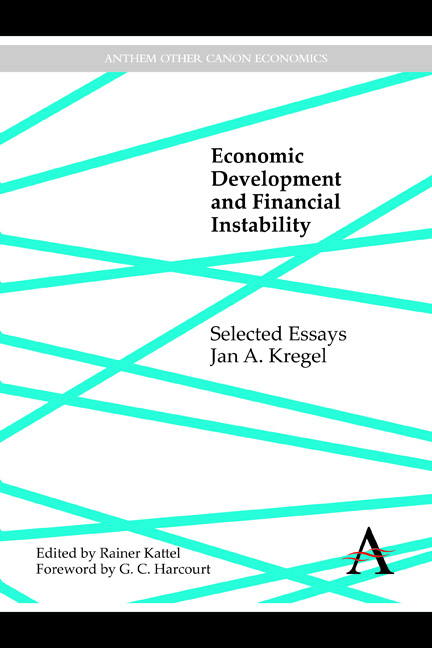Book contents
- Frontmatter
- Contents
- Foreword
- Publication History
- I Theoretical Discussions
- II Finance for Development
- 9 East Asia Is Not Mexico: The Difference between Balance of Payments Crises and Debt Deflations
- 10 Yes, “IT” Happened Again: The Minsky Crisis in Asia
- 11 Financial Liberalization and Domestic Policy Space: Theory and Practice with Reference to Latin America
- 12 Derivatives and Global Capital Flows: Applications to Asia
- 13 Was There an Alternative to the Brazilian Crisis?
- 14 An Alternative View of the Argentine Crisis: Structural Flaws in Structural Adjustment Policy
- 15 The Discrete Charm of the Washington Consensus
- III The Crisis in the US and the EU
- Index
14 - An Alternative View of the Argentine Crisis: Structural Flaws in Structural Adjustment Policy
from II - Finance for Development
Published online by Cambridge University Press: 05 November 2014
- Frontmatter
- Contents
- Foreword
- Publication History
- I Theoretical Discussions
- II Finance for Development
- 9 East Asia Is Not Mexico: The Difference between Balance of Payments Crises and Debt Deflations
- 10 Yes, “IT” Happened Again: The Minsky Crisis in Asia
- 11 Financial Liberalization and Domestic Policy Space: Theory and Practice with Reference to Latin America
- 12 Derivatives and Global Capital Flows: Applications to Asia
- 13 Was There an Alternative to the Brazilian Crisis?
- 14 An Alternative View of the Argentine Crisis: Structural Flaws in Structural Adjustment Policy
- 15 The Discrete Charm of the Washington Consensus
- III The Crisis in the US and the EU
- Index
Summary
I. The Causes of the Argentine Crisis: The Official View – Lax Fiscal Policy
On Christmas Eve of 2001, the government of Argentina announced the suspension of payment on its debt service commitments on non-official borrowing. It joined an expanding group of Latin American and Asian countries that had once been championed as examples of the benefits of the sound economic policies implemented in the context of IMF structural adjustment programmes, but whose successes were rapidly reversed by major financial crisis.
The ongoing crisis in Argentina is of especial interest since Argentine economic policy had been supported by an IMF lending programme, and thus under continuous Fund surveillance, for the last decade. Despite the fact that during the 1980s and 1990s consolidated government expenditures in real terms grew at an average rate of around 2 per cent per annum (see Appendix), that the share of government expenditures in GDP was between 20 and 30 per cent and for most of this period, and the share of debt to GDP and the ratio of the government fiscal deficit to GDP would have been compatible with the convergence criteria set by the EU for participation in the common European Currency, it has nonetheless generally come to be accepted that the major cause of the problems in Argentina was inappropriate fiscal policy, and in particular the failure to achieve budget surpluses during periods of rapid growth that would have reduced outstanding debt and provided space for more active counter-cyclical fiscal policy during periods of recession.
- Type
- Chapter
- Information
- Economic Development and Financial InstabilitySelected Essays, pp. 215 - 240Publisher: Anthem PressPrint publication year: 2014

